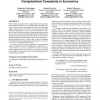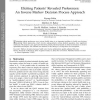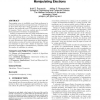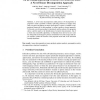281 search results - page 1 / 57 » A revealed preference approach to computational complexity i... |
SIGECOM
2011
ACM
12 years 7 months ago
2011
ACM
Recent results in complexity theory suggest that various economic theories require agents to solve computationally intractable problems. However, such results assume the agents ar...
ECCC
2008
13 years 4 months ago
2008
Given a set of observed economic choices, can one infer preferences and/or utility functions for the players that are consistent with the data? Questions of this type are called r...
DA
2010
13 years 1 months ago
2010
. Direct approaches, which involve asking patients various abstract questions, have significant drawbacks. We propose a new approach that infers patient preferences based on observ...
ATAL
2006
Springer
13 years 8 months ago
2006
Springer
Encouraging voters to truthfully reveal their preferences in an election has long been an important issue. Previous studies have shown that some voting protocols are hard to manip...
ICA
2012
Springer
12 years 2 days ago
2012
Springer
A novel tensor decomposition called pattern or P-decomposition is proposed to make it possible to identify replicating structures in complex data, such as textures and patterns in ...




